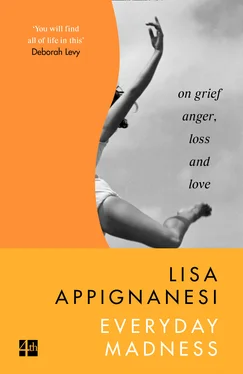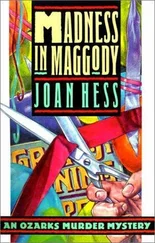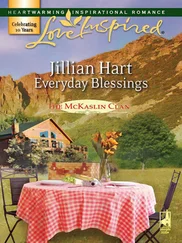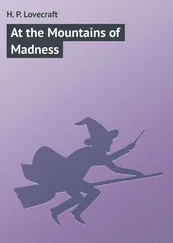My mother’s own display of tears had been confined, as far as I witnessed, to the deathbed. After that she had smiled in her usual sunny way through thick and thin and stayed cool, while I tumbled as rapidly as I could into bed with a man, as if to confirm the eternal strife between death and life.
Given that I had read so many novels in which families fall asunder as soon as the patriarch dies, his departure igniting siblings and their children to war, let alone newer and older wives, I had little excuse for straying into the trap of bickering and conflict with my own brood. But my inner madness came in unpredictable waves and sometimes bubbled over and out. The smiling coolness my daughter sometimes wondered at was the mirror image of my mother’s; the harsh wartime survival stories she told, in which my father appeared diminished, were perhaps the equivalent of my negative asides.
As I had for my own mother, my daughter often thought she knew what was best for me. I, too, had known better than my mother about the ways of the contemporary world and, in my assumptions of knowing, had been even more emphatic than my wonderful daughter. But I balked when it came to me. Though I obediently trailed off to see doctors when ordered to, made sure there was food in the fridge, and invited friends over one at a time, I also sensed that, just as I had, my daughter needed me at important points to maintain my maternal authority. Then, too, I wasn’t altogether ready for a full King Lear reversal. Yet at times, for the first six months after her father’s death, I seriously considered it. Giving in and giving up seemed very seductive.
I knew my daughter was suffering at the loss of her beloved dad, who had adored her in turn. I also knew that the loss had come at a particularly difficult time for her. His advice and towering pride in her would have been important. My occasional irritability or inappropriate babble was in some instances the mask of control slipping. Early in that first year, though it might already have been summer, and after a difficult lunch, I emailed her:
I’m sorry if I haven’t been paying enough attention to the ups and downs of grieving.
I find the process utterly unpredictable, like a deep rumble inside one which sums up all the lacks there have ever been, and isn’t really assuageable. Sometimes it’s too loud to hear anything else. So I kick against it. At other times it’s just there, a dull throb, a backdrop that you don’t have to confront, and I race along in my deaf way. I will try to be more sensitive to you.
Needless to say, I don’t remember the precise situation that necessitated this apology.
I THOUGHT OF MY MOTHER a lot in those days and nights of an afterlife in which I was battling for some kind of clarity. Her husband had died in a country she barely knew. They had only recently retired and made a home here. She had few friends of her own, but she tried to make do. She flew to and from Canada, where my brother and his family lived. She was a little lost now in both countries. Her often irascible daughter (me) had recently split up with her husband, and had a small child with whom Granny had a deep bond. That, I now realize, is probably what in large part kept her coming here and led her to spend more time in London.
She took in a lodger who was a friend of mine. He happened to be black: she had no idea that neighbours’ lips would curl and malicious chatter would erupt among visiting friends from abroad. She rarely talked of my father. Perhaps she felt not unlike I have in the aftermath, but it wasn’t something she could talk about or perhaps accede to. The very thought of madness, even of the everyday kind, would for her have carried a stigma. And she was proud.
When she died, purportedly of a cold, twenty years later, after two final years of Alzheimer’s had robbed her of English, French, and all recognition of her nearest, I found a few of my father’s things still in her house. A silk robe, some cufflinks, an ancient prayer shawl, rarely worn, that might well have originated before the Second World War in Poland and made its way with them through their various migrations. She still wore her wedding band. Before that last long illness took a grip on her, when she talked of my father it was always of him as a younger man, even if that brought memories of terrible times. More often, as she grew older, her own father and brother captured her attention, earlier losses that had deeply affected her. It seems one loss reinvigorates all the prior ones. Death is most at home with other deaths.
It’s shaming to admit, but I didn’t mourn her death. Her mind had left her body behind several gruelling years back, and her ultimate passing felt like a relief to everyone. Only years later did I begin to dream about her and allow her to inhabit my life once more. She would often appear with a calm, youthful smile in the kind of rural landscape I didn’t consciously associate with her, as if some part of me wanted her to be returned to a girlish innocence.
WE BURIED JOHN’S ASHES on 19 February 2016. It was a bitterly cold grey day. We planted a rose bush for him that would eventually burst with dark pink buds for the length of the summer, and surrounded him with anemones and primroses. He loved flowers, he loved digging, was a keen gardener. We read – psalms, poems, Raymond Carver’s ‘Late Fragment’, which always brings tears to my eyes, even when I’m not crying. It formed part of my ongoing inner conversation with John. I had met Carver once and remembered him as a big gentle bear of a man, though I certainly knew he wasn’t only that.
And did you get what
you wanted from this life, even so?
I did.
And what did you want?
To call myself beloved, to feel myself
beloved on the earth.
Putting John in the ground in a carefully chosen and beautiful spot at the top of a hill, not far from George Eliot, Karl Marx and Eric Hobsbawm, a friend who had also known John’s father, seemed not only crucial but an important marker. I selected the site with an eye to the fact that it was overseen by a stone angel. As importantly, we could push through brambles and stand on a ledge to see the grave from Waterlow Park, where long ago we used to take the children for walks. I thought once we had buried him on this familiar hill close to so many friends, my mind would be easier and his ghost calmer.
There was still a distance to travel, one full of potholes you could tumble into and never surface from again, without somehow acquiring a new, transformed shape.
One day, on my way home from a meeting in the Strand, I did literally tumble. It must have been April, by then. I was feeling just a little pleased with myself for having performed adequately, not fainted, managed sanity, or what passes for it, and even humour. Then, by some aberration, I decided to run for an approaching bus. I never take the bus. I hadn’t run for years. But I ran then along a crowded Aldwych, weaving between people, like some ancient rugby player toting a bright blue bag instead of a ball. The pavement wasn’t impressed. The ground under my feet rebelled. I fell flat on my face. A crowd gathered round. The pain, the shock, the humiliation were dreadful, but by some miracle, I hadn’t broken anything, not even, it turned out, my nose, though it felt distinctly out of joint. A nice young woman put me into a cab. By the time I got home my face had started to turn black and blue. The next morning, I looked like a victim of serious domestic abuse. The trouble was, I was my own domesticity.
And even then, in the midst of terrible pain, the tears didn’t come.
Nor would the ground quite hold John. A furry new revenant, a bear-like charcoal cat, silky to the touch, with a round face and intent yellow eyes, appeared. We had seen it here and there on the street for several years. I think he was a British shorthair. John had a fondness for him. Now the cat decided he really needed to move in with me. No sooner was the front door open than he would streak past and disappear into the house. I would look diligently in every room and under sofas. Invariably I would find him upstairs, curled up in pride of place on a plush red velvet armchair in John’s study, right next to his desk. I began to think he looked a little like the chair’s last incumbent. Had John been transformed into this unreadable familiar? I would carry Puss out, not wanting to leave him in the house alone. But I felt as guilty as if I were putting John, himself, out.
Читать дальше












